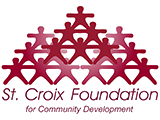At the core of the St. Croix Foundation’s commitment to our public education system is our children and our awareness of the amazing potential that lies in every one of them. But, the reality is that every day our social services and public safety agencies are forced to deal with many of the Territory’s failures to serve the needs of our children with fidelity.
When we launched our Model Schools Initiative in 2005 and began to work directly in our schools, we didn’t know how much insight it would provide about our children. Overall, what we learned about our students is very positive—they are talented and curious, gregarious and charismatic. They have the capacity to move from one unrelated subject to the next faster and more accurately than most adults do on their best day. Born in the Digital Age, our students have never known a time without computers or cell phones. Unfortunately, our young people’s gift for navigating the Digital Age is our educators’ biggest challenge: keeping students engaged with the same chalkboards, textbooks, and teaching strategies of 20 years ago.
We also found that our students span a vast range of individual competencies and family backgrounds, and we now stand in awe of what our schools accomplish in educating and nurturing all our children and doing so effectively—a daunting and high-stakes task. Even beyond the impact of the Digital Age, the average child today has an extremely different home life than those of just one generation past. According to the 2012 Kids Count, in just six years, the percentage of children living in single-parent households rose from 35% to 58.8% (from 2003-2009). Poverty rates have also increased: in 2010, 31% of all families in the Virgin Islands lived in poverty compared to 24.9% in 2009. On St. Croix, the 2010 poverty rate was 36%.
How our children are faring inside our schools is equally distressing. Based on the 2012-2013 Report Card from the Virgin Islands Department of Education, 68.2% of 7th graders are reading below grade level; and less than 36% of 11th graders are proficient in reading. This means that approximately 2 out of 3 of our 7th and 11th graders are not reading at grade level. The 2012 Kids Count also reported that 18.9% of our 16-19 year olds were not enrolled in school, were not graduates, and were not employed. Some believe the numbers are much grimmer. As a result, the Foundation is constantly grappling with a sense of urgency and an obligation to advocate for rapid improvements in our schools.
Over the last 10 years, we have spent a considerable amount of time visiting schools, learning first-hand their day-to-day challenges. We encourage all education stakeholders, especially candidates seeking elected office, to do the same. Some of the observations we made illuminated skill gaps that we believe make educational reform in the Virgin Islands a formidable challenge. In general, we found that a large number of students exhibited:
- Limited vocabulary, poor grammar, speech, and writing skills
- Lack of attachment to learning and/or academic excellence
- Limited exposure to the world beyond their immediate environments
- An inability to ‘switch code’ between local dialects and Standard English
- Extraordinary confidence in the face of their academic deficiencies
Recognizing these issues, in 2009, the Foundation launched our Youth Advisory Council (YAC) seeking to give a voice to our youth. Comprising junior high and high school students from our public and private schools, YAC members have sought to better understand the challenges facing their peers. In 2012 the Council surveyed over 900 of their peers and identified, overwhelmingly, that mentoring and motivation are their greatest needs! Among the expected responses, like violence and peer pressure, students also acknowledged in personal interviews “the need for self-confidence; lack of positive influences; lack of motivation; and a corrupt society.”
We are listening and we urge our entire community to take heed, because the bottom line for every one of our students is simple: they have an untold amount of talent and intellect that we, as a community, have failed to effectively nurture to their and our own detriment. Moreover, while all of the data and the statistics may indicate what is happening to our young people, numbers can never paint an accurate picture of who they really are. And no matter how we categorize and class our children, their potential is our potential.
We challenge everyone to get involved and to ask our candidates what specific education policies they plan to sponsor in support of the welfare of our children and our Territory.
This editorial is part of the St. Croix Foundation’s Education First Campaign and will run every Wednesday for the next several weeks. For more information, contact the Foundation at 773.9898.
Sources:
Percent of Children in Single Parent Households
US Virgin Islands Kids Count Data Book 2012, page 6:
https://www.cfvi.net/documents/2012_KidsCount_Data_Book.pdf
Poverty Rates
US Virgin Islands Kids Count Data Book 2012, page 10:
https://www.cfvi.net/documents/2012_KidsCount_Data_Book.pdf
Academic Scores
No Child Left Behind Adequate Yearly Progress Report, VI Department of Education: https://vide.nclbreports.avr247.com/VIDOE/Reports/web/VIDOE/OverAllAYP.aspx
Non-graduates/unemployed 16-19 Year Olds
US Virgin Islands Kids Count Data Book 2012, page 6:
https://www.cfvi.net/documents/2012_KidsCount_Data_Book.pdf
